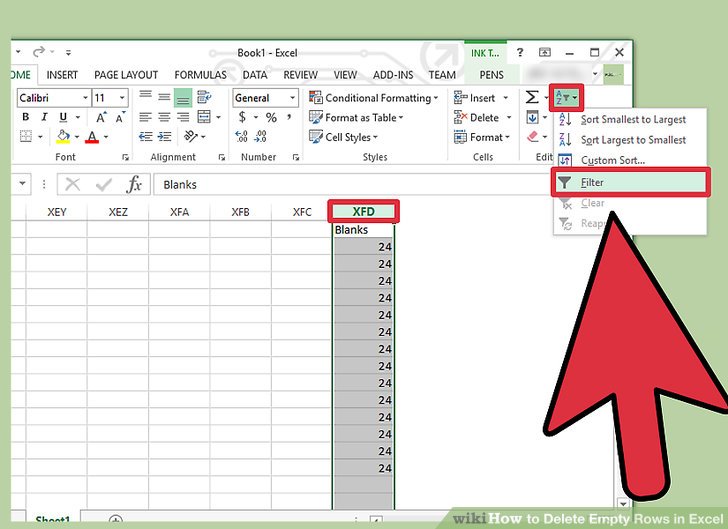Imagine a spreadsheet, a vast landscape of data. But amidst the valuable information lies a scattering of empty rows, disrupting the flow and hindering your analysis. These blank spaces, though seemingly insignificant, can create unnecessary complexity and make working with your data a less efficient process. This guide provides a clear path to reclaiming your spreadsheet's clarity by effectively removing those blank rows.
Clearing out blank rows in Excel isn't just about aesthetics. It's about preparing your data for analysis, ensuring formulas function correctly, and presenting a professional, organized sheet. Think of it as tidying up your workspace - a clean spreadsheet allows you to focus on what truly matters: the data itself.
The need to remove blank rows arises from various situations. Perhaps you imported data from another source, leaving gaps in the information. Maybe you deleted some data, leaving the rows empty. Or perhaps your spreadsheet is a collaborative document, and blank rows have appeared through edits and additions over time. Regardless of the cause, the solution lies in mastering a few simple techniques.
Excel has offered various ways to delete empty rows since its early iterations. The core function has always remained, though specific tools and interface elements have evolved with each version. The underlying importance of this feature has also persisted – ensuring clean and manageable datasets for analysis and presentation. Understanding this historical context helps us appreciate the range of options available today.
One of the core issues when deleting blank rows is accidentally removing rows that appear blank but actually contain hidden data, formulas, or formatting. This can lead to data loss or corrupted formulas. Therefore, it’s crucial to understand the nuances of each method and apply them with care. This guide will address these concerns, providing clear steps and precautions to avoid these pitfalls.
A blank row, in the context of Excel, is a row that contains no visible data or formulas. However, it may contain formatting. It's important to differentiate between truly empty rows and those that appear empty but may contain hidden information.
Benefit 1: Improved Data Analysis: Removing blank rows simplifies data analysis. For example, if you're using functions like SUM or AVERAGE, blank rows can skew the results. Cleaning up your data ensures accurate calculations.
Benefit 2: Enhanced Spreadsheet Performance: Large spreadsheets with many blank rows can slow down Excel's performance. Deleting these unnecessary rows can significantly improve the responsiveness of your spreadsheet.
Benefit 3: Professional Presentation: A spreadsheet without blank rows looks cleaner and more professional. This is especially important when sharing your work with others.
Action Plan:
1. Open your Excel spreadsheet.
2. Select the area containing the blank rows.
3. Use one of the methods detailed below (filtering, Go To Special, or VBA) to select the blank rows.
4. Delete the selected rows.Step-by-Step Guide using Filtering:
1. Select the entire data range.
2. Go to the Data tab and click on Filter.
3. In the drop-down menu of any column, unselect (Select All) and then select only the blank option.
4. Click OK. This will display only the blank rows.
5. Select all the visible rows and right-click to delete them.Advantages and Disadvantages of Removing Blank Rows
| Advantages | Disadvantages |
|---|---|
| Improved Data Analysis | Potential accidental deletion of rows with hidden data if not careful |
| Enhanced Spreadsheet Performance | Requires some time and effort, especially for large datasets |
| Professional Presentation |
Best Practice 1: Always save a copy of your spreadsheet before making significant changes.
Best Practice 2: Double-check that you are not deleting rows containing important hidden information.
Best Practice 3: Choose the method that best suits your data and skill level.
Best Practice 4: Consider using the "Find & Replace" method for small datasets with clearly blank rows.
Best Practice 5: If using VBA, ensure you understand the code before running it.
FAQ 1: What is the fastest way to delete blank rows? Using the "Go To Special" dialogue box or VBA macro are generally the fastest methods.
FAQ 2: Can I undo deleting rows? Yes, you can usually undo the deletion by pressing Ctrl+Z (or Cmd+Z on a Mac).
In conclusion, removing blank rows in Excel is a simple yet crucial step in optimizing your spreadsheets. From improving data analysis accuracy to enhancing overall performance and presenting a professional appearance, the benefits are clear. By understanding the various methods available and applying them carefully, you can effortlessly clear out unnecessary clutter and unlock the true potential of your data. Start applying these techniques today and experience the difference a clean, efficient spreadsheet can make. Take control of your data and simplify your workflow – a well-organized spreadsheet is just a few clicks away.
Cool drum gifs for wallpapers music elevate your screen with rhythm
Unveiling the dg52 salary and allowance system in malaysia
Unlocking the fog exploring the calvin mod list phenomenon
Excel How To Eliminate Blank Rows At Bottom - Khao Tick On
How To Remove Empty Rows In Excel - Khao Tick On
How To Remove Empty Cells In Power Query - Khao Tick On
How To Get Rid Of Empty Rows In Excel - Khao Tick On
Excel How To Eliminate Blank Rows At Bottom - Khao Tick On
Remove Blank Rows In Excel Delete Empty Columns And Sheets - Khao Tick On
How To Remove Blank Rows In Excel Power Query - Khao Tick On
How To Hide Blank Cells Excel at Bertha Prater blog - Khao Tick On
Delete All Empty Columns In Excel Vba - Khao Tick On
How to easily remove blank rows in Excel example - Khao Tick On
Delete Blank Rows In Excel Using Python - Khao Tick On
How to delete blank rows in Excel - Khao Tick On
How To Delete Blank Rows In Excel Quickly And Easily - Khao Tick On
How To Remove Empty Rows In Excel Using Vbscript at Maurice Lockett blog - Khao Tick On













